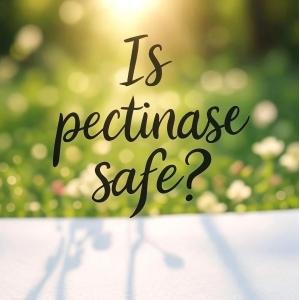Is pectinase safe

Pectinase is a naturally occurring enzyme that's widely used in everything from fruit juice production to winemaking. But if you've come across it in an ingredient list or a supplement and started wondering, "Is pectinase safe?"—you're not alone. Here's what you really need to know.
What Exactly Is Pectinase?
Pectinase is a group of enzymes that break down pectin, which is a kind of fiber found in the cell walls of plants. When used in food processing, it helps clarify juices, increase yield in fruit extraction, and improve the texture and flavor of various products.
It’s also found in some digestive enzyme supplements because it helps break down plant materials in your gut, making nutrients easier to absorb.
Is Pectinase Safe to Eat?
Yes, for most people, pectinase is considered safe. It’s been used in the food and beverage industry for decades, and regulatory bodies like the FDA and EFSA recognize it as safe when used correctly. The enzyme is typically used in such small quantities that it doesn’t pose a health risk to the general population.
It’s important to know that pectinase itself doesn’t stay active after processing—especially since high temperatures during pasteurization deactivate the enzyme. So by the time it reaches your plate, it's usually just a trace component or already inactive.
What About Supplements?
Pectinase is also added to enzyme blends in supplements aimed at improving digestion, especially for people who struggle with high-fiber foods. In those cases, it helps break down plant materials more efficiently. Most people tolerate it well, and it can actually reduce bloating and discomfort for some.
Still, like with any supplement, it’s a good idea to talk to your healthcare provider if you’re planning to take pectinase regularly, especially if you have a sensitive stomach, are pregnant, or are dealing with any chronic health condition.
Are There Any Side Effects?
Side effects from pectinase are rare. In a few cases, people may experience mild stomach upset or allergic reactions—usually only if they have a general enzyme sensitivity. Industrial exposure to large quantities of enzyme powder (like in factories) may cause respiratory irritation, but that doesn’t apply to everyday food or supplement use.
Who Should Be Careful?
While pectinase is generally safe, people with known allergies to enzyme blends or those with highly sensitive digestive systems might want to avoid supplements that include it—at least until they’ve talked to a doctor. But when it’s used in food processing, the risk is very low because it’s either removed or inactivated by the time you eat the product.
The Bottom Line
If you’re eating food made with pectinase or taking it as part of a digestive supplement, chances are you’ve got nothing to worry about. It’s a well-studied enzyme that’s been safely used for years. As long as you're not overdoing it or using it in raw, concentrated forms without guidance, you're in the clear.
